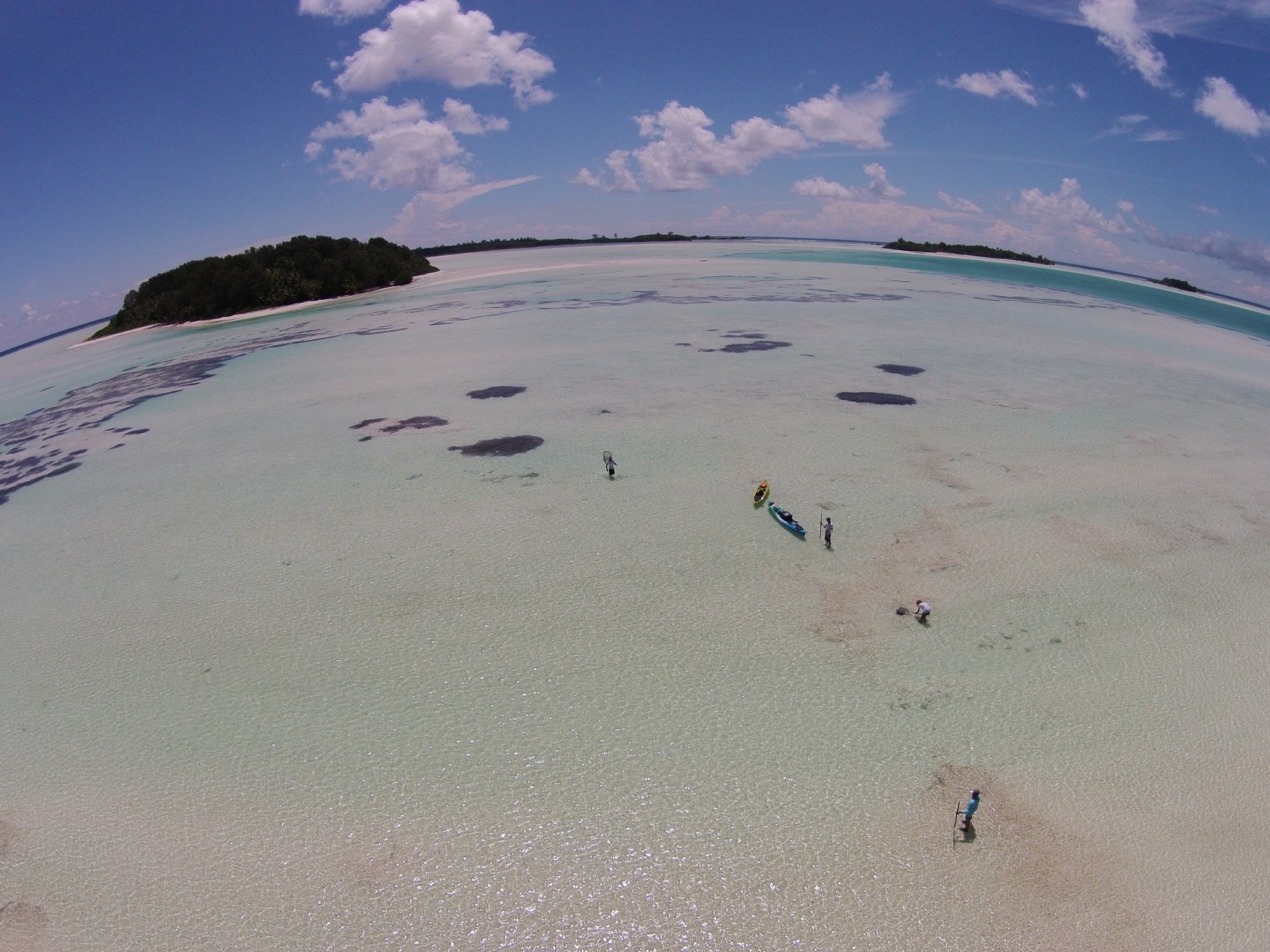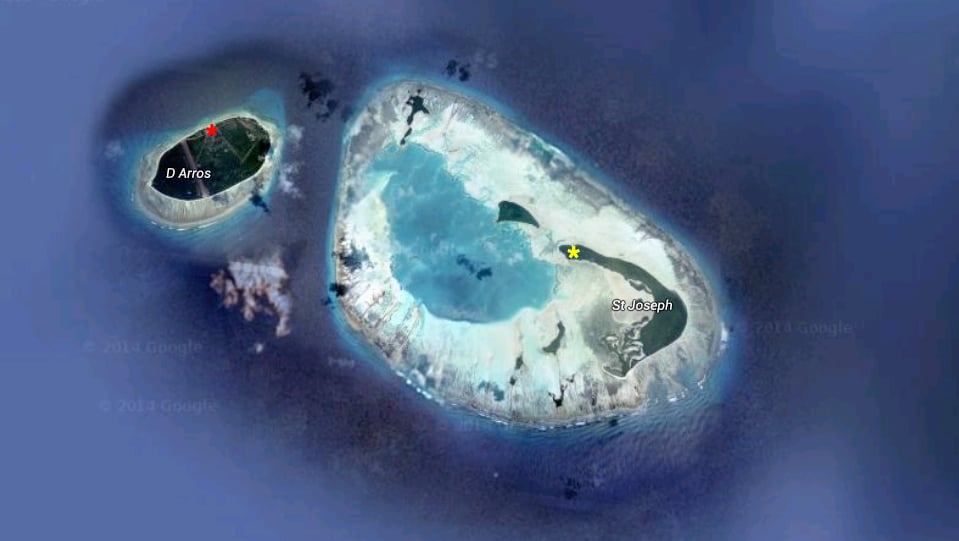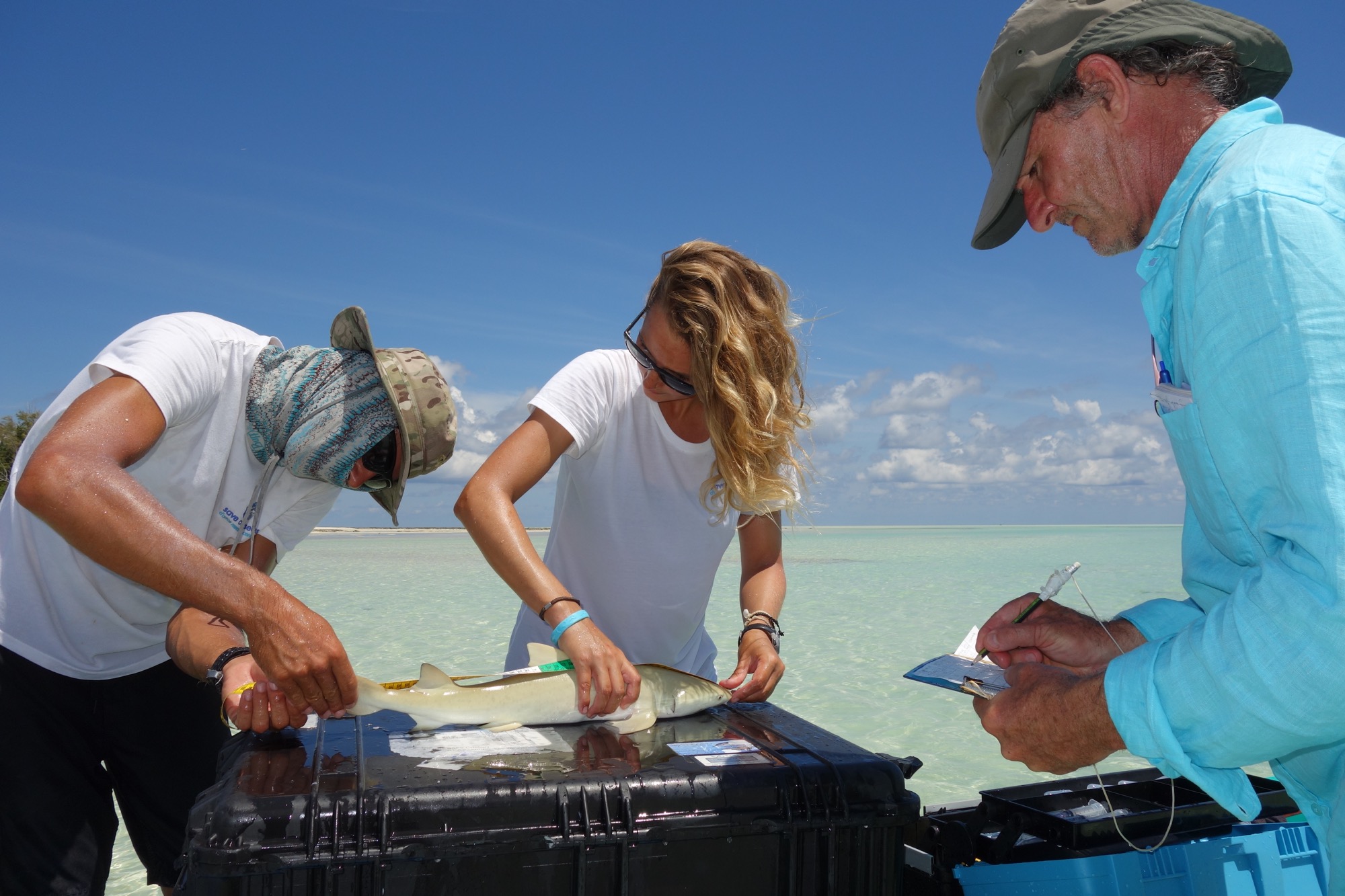Internship at the SOSF-D’Arros Research Centre – Shark Nursery Project
The Save Our Seas Foundation D’Arros Research Centre (SOSF–DRC) is looking for research assistants to help with a shark nursery project at St Joseph Atoll, a remote atoll adjacent to D’Arros Island, one of the tropical Outer Islands of the Seychelles. The project will run from the beginning of March to the beginning of May 2015 (exact dates have not yet been set).

Catching juvenile sharks at St Joseph Atoll. Photo by Michael C. Scholl | © Save Our Seas Foundation
Conditions
Volunteers must arrange and pay for their travel to Mahé (main island of the Seychelles) and must cover their own travel, medical, evacuation and dive insurance. All other expenses, including food, lodging and inter-island flights between Mahé and D’Arros Island, will be covered by the SOSF–DRC.
Work
Since juvenile blacktip reef sharks Carcharhinus melanopterus and sicklefin lemon sharks Negaprion acutidens are born on the shallow, sandy flats of St Joseph Atoll, our work will be based mainly at the atoll. There is a camp on the atoll and we will stay there overnight. We have regular transports back to D’Arros Island where we will pick up supplies of food, water and laboratory equipment. The St Joseph camp hosts up to eight people and is small and basic, with no electricity or running water, etc.
Our work includes (among other things):
– catching and tagging juvenile blacktip reef and sicklefin lemon sharks;
– collecting tissue samples (fin clips, blood, stomach contents, etc.);
– actively tracking both species;
– analysing stomach contents.
Challenges & requirements
Candidates must be able to endure physical labour in tropical conditions, including high humidity and long and very intense exposure to the sun, as well as long working days and mosquitoes (mainly at the camp). Since all our work will be outside, candidates are required to have a love for nature. They will preferably also have a degree in biology or environmental science and/or previous field work experience.
To apply
If you are interested, please apply by 18 January 2015, sending a CV, a statement of interest and the names and contact details of three references to ornella.weideli@gmail.com
Information about D’Arros Island and the D’Arros Research Centre
D’Arros Island and the neighbouring St Joseph Atoll are located in the Republic of Seychelles in the Western Indian Ocean. They are part of a chain of small islands that comprise the Amirantes Group, named for the bank on which they are situated. The Amirantes Bank is a submerged landmass approximately 180 km by 40 km in size, where the water depth is generally shallower than 40 m. D’Arros and St Joseph are among the northern islands of the group, which stretches from African Banks in the north to Desnoeufs in the south. The bank is separated by deep water from Desroches Island to the east and the Alphonse Island group to the south.

Red Star: The SOSF–DRC located on D’Arros Island. Yellow star: The camp on St Joseph Atoll. Photo: © Google Maps
D’Arros Island rises from a depth of 30–60 m. It is an oval sand cay comprising approximately 170 ha of dry land (major axis = 1.9 km, minor axis = 1 km) and 100 ha of intertidal reef flat. The beaches are entirely sandy and the interior is flat and featureless (maximum elevation of 3 m). The island is separated from St Joseph Atoll to its north by a channel 1.1 km wide and 60 m deep. The atoll comprises a ring of 12 islands (139 ha of dry land) situated on a broad reef flat (1774 ha) surrounding a shallow lagoon (480 ha). The terrestrial characteristics of the individual islands are similar to those of D’Arros.
With a mean annual rainfall of 1490 mm, D’Arros receives most of its rain during the north-west monsoon between December and March. For the remainder of the year the island is subjected to strong south-easterly winds and relatively dry weather. Sea temperatures vary between a general minimum of 25 °C in winter to 30 °C in summer. Visibility underwater ranges between 10 and 20 m, but is generally better during the north-west monsoon.
In recognition of the islands’ outstanding natural value, the SOSF D’Arros Research Centre was established by their owners in 2004, with the chief objectives to protect and monitor on a long-term basis the surrounding marine ecosystems and their threatened species. In collaboration with renowned turtle expert Dr Jeanne Mortimer, a community-based sea turtle monitoring programme was initiated in the same year. Today, after 10 years of consistent monitoring, this programme is the most successful of its kind in the Amirantes. Following an initial baseline marine survey, a coral reef monitoring programme was implemented in 2005 in an attempt to detect and explain eventual changes in the structure of coral reef communities. In addition to the long-term turtle and coral reef monitoring programmes, the SOSF–DRC has initiated no fewer than 34 research projects to date, in collaboration with 23 conservation institutions. Since 2012, the D’Arros Research Centre has been managed by the Save Our Seas Foundation (SOSF), which has significant experience in marine conservation and maintains extensive networks with respected scientists and research institutions.
The SOSF–DRC infrastructure consists of an office/conference room, a dry and wet laboratory and an outdoor flow-through tank system, and a nursery. The office/conference room includes a library, herbarium and computer stations, as well as a large digital display for presentations. The laboratory enables both wet and dry work to be carried out and contains modern equipment such as a digital microscope, a -20 °C freezer, a digital scale, a drying oven and a centrifuge. Other notable equipment includes two research boats, oceanographic data-logging systems, cameras and dive gear.
Questions? Send an e-mail to the project leader, Ornella Weideli, at ornella.weideli@gmail.com

